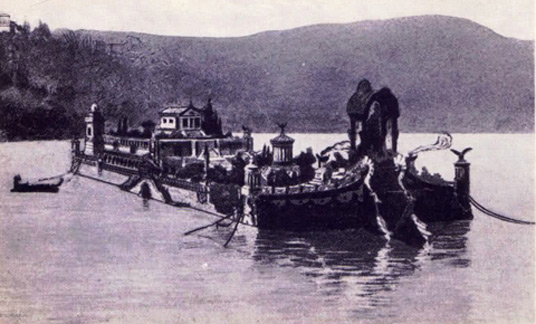Shipwrecks of the distant past
By Amal Hewavissenti
For thousands of years, ships of all types have travelled the seas
and oceans. Tragic enough, a number of such ships carrying slaves,
warriors, gold, wine jugs, tourists and automobiles have gone down in to
the ocean depths instead of reaching their respective destinations. They
have sunk in to the deep oceans taking with them all that they were
carrying.
Sunken ships may hold treasure of varied kinds such as gold coins,
rubies and emeralds that may illustrate the way people lived in the
past. The basic learning from shipwrecks lies in the careful study and
observation of the sites and their contents by nautical archaeologists.
However shipwrecks provide fascinating glimpses into the past.
Strange objects
In 1983, a joint American - Turkish team went to investigate the
strange objects lying half-buried in the sea near Ulu Burun, a cape near
Southern Turkey. The scientists discovered large copper ingots with
ear-shaped handles and also found parts of a hull which had carried the
ingots. After much study, the scientists came to an exciting realisation
that the wreck would perhaps be the oldest ship ever excavated.
|

An artist's reconstruction of Caligula's pleasure barge. |
Their research reports show that cargo from at least seven countries
had gone down with the ship. The scientist had mapped and photographed
the whole site in detail for future study before a single object was
removed from the wreckage.
At the final stage of the project which began in 1984, the team of
nautical archaeologists managed to assemble a priceless collection of
late Bronze Age artefacts produced between 1600 BC and 1050 BC. The
cargo of the wrecked ship originated largely in the eastern
Mediterranean countries - a powerful clue to conclude that the ship was
west bound when the disaster struck.
They discovered that the ship was carrying raw materials such as
glass, wood, ivory, tin and about six tons of copper ingots which were
adequate (when mixed with tin) to equip a small army with bronze
weapons. The archaeologists also uncovered the oldest known notebook
which was an ivory hinged tablet with wax surfaces for writing. All
these artefacts uncovered from the wreck made the nautical
archaeologists to deduce that the sinking had occurred some 1350 years
before the birth of Christ.
The sinking represented a financial disaster for unknown merchants in
the Bronze Age and the experts studying the wreck have pieced together
its story. Cemal Pulak, the nautical archaeologists rightly remarks.
"The wreck off Ulu Burun is a slice of history frozen in time".
In the depths off Ulu Burun, an archaeologist found a real prize - a
bronze sword of a type carried by wealthy men of the period as experts
say. Perhaps the "captain of the Ulu Burun Ship" might have kept it in
possession to fight off pirates or the weapon may have belonged to a
travelling merchant.
The sea can separate countries and also join them. The sea was a
barrier or an international highway on which goods and varied cultures
were traded and disseminated.
Caligula's pleasure barges
Caligula, emperor of Rome in the first century AD, was definitely
strange, perhaps insane and his cruelty made him a legend. He claimed to
be a god and sometimes ordered criminals to be food for wild animals in
the sports arena as ancient biographers report.
Caligula obviously had a great penchant for high standard of living
and immediately after becoming the emperor of Rome, he ordered the
construction of two "floating palaces" (to be built probably at public
expense).
It is totally obscure whether Caligula ever invited the public aboard
and it is believed, however, that the barges served mainly for his
personal pleasure. The vessels were equipped with splendid court yards,
magnificent banquet rooms and luxurious baths with an army of servants
employed to serve at the snap of a finger. They were a luxury in Roman
style.
In AD 41, emperor Caligula was assassinated and his barges at some
unknown time sank in Lake Nemi, outside the kingdom of Rome. For
centuries people living near Lake Nemi were aware that the ancient
vessels lay motionless on the lake bottom. In 1928, however, Italy's
leader Benito Mussolini ordered Lake Nemi drained in an attempt to raise
the wrecked ships.
Roman luxury
The project of locating the wreckage took up several years until
finally the hulls of the ships became visible. They were restored and
placed on public display in a museum near Lake Nemi. Yet, in the heat of
world war II, the hulls were destroyed by a conflagration.
Emperor Caligula had a taste for high living. A rare painting of the
"floating palaces" of Caligula shows the emperor entertaining aboard one
of his pleasure barges before the great catastrophe.
The painting shows visitors lounging on couches are enjoying a meal
in a richly furnished banquet room. The food was the choicest in Rome
during the period.
After the meal, the guests could stroll through any of the several
court yards which had, as centrepieces elegant fountains and statues.
Running water was piped throughout the barges and guests could, on
their wish, take a relaxing bath in their choice of pools before
retiring to their bed rooms for the night.
The scenes of the painting are based on writings of the time, on
artefacts found at the bottom of the Lake Nemi and on knowledge of Roman
architecture. Experts are of the view that this painting offers a
reasonably accurate idea of the high life on board Caligula's pleasure
barges. Now the barges exist only in drawings and old photographs and in
the imagination. |

